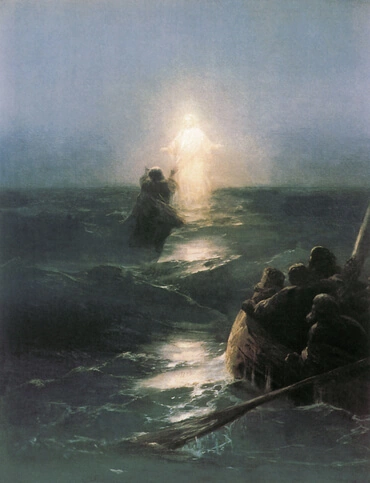1
På den tid fikk fjerdingsfyrsten Herodes høre ryktet om Jesus,
2
og han sa til sine tjenere: Dette er døperen Johannes; han er opstanden fra de døde, og derfor er det disse krefter er virksomme i ham.
3
Herodes hadde grepet Johannes og bundet ham og kastet ham i fengsel for Herodias' skyld, som var hans bror Filips hustru.
4
For Johannes hadde sagt til ham: Det er dig ikke tillatt å ha henne.
5
Og han vilde gjerne slå ham ihjel, men fryktet for folket; for de holdt ham for en profet.
6
Men da det var Herodes' fødselsdag, danset Herodias' datter for dem, og Herodes syntes om henne;
7
derfor lovte han med ed å gi henne hvad hun vilde be om.
8
Men hun sa efter sin mors råd: Gi mig hit døperen Johannes' hode på et fat!
9
Og kongen blev ille til mote, men for sine eders og for gjestenes skyld bød han at det skulde gis henne,
10
og han sendte sine folk avsted og lot Johannes halshugge i fengslet.
11
Og de kom med hans hode på et fat og gav det til piken, og hun bar det til sin mor.
12
Og hans disipler kom til og tok hans legeme og begravde det; og de gikk og fortalte det til Jesus.
13
Da Jesus hørte det, drog han derfra i en båt avsides til et øde sted, og da folket fikk høre det, fulgte de efter ham til fots fra byene.
14
Og da han gikk i land, så han meget folk, og han ynkedes inderlig over dem og helbredet deres syke.
15
Men da det var blitt aften, gikk hans disipler til ham og sa: Stedet er øde, og det er alt sent på dagen; la derfor folket fare, så det kan gå bort i byene og kjøpe sig mat!
16
Men Jesus sa til dem: De har ikke nødig å gå bort; gi I dem å ete!
17
De sa til ham: Vi har ikke mere her enn fem brød og to fisker.
18
Men han sa: Hent dem hit til mig!
19
Og han bød at folket skulde sette sig ned i gresset, tok de fem brød og de to fisker, så op mot himmelen og velsignet dem; og han brøt brødene og gav dem til disiplene, og disiplene gav dem til folket.
20
Og de åt alle og blev mette; og de tok op det som blev tilovers av stykkene, tolv kurver fulle.
21
Men de som hadde ett, var omkring fem tusen menn foruten kvinner og barn.
22
Og straks nødde han sine disipler til å gå i båten og sette over til hin side før ham, inntil han hadde latt folket fare.
23
Og da han hadde latt folket fare, gikk han avsides op i fjellet for å bede; og da det var blitt aften, var han der alene.
24
Men båten var alt midt ute på sjøen og arbeidet hårdt mot bølgene, for vinden var imot.
25
Men i den fjerde nattevakt kom han til dem, vandrende på sjøen.
26
Og da disiplene så ham vandre på sjøen, blev de forferdet og sa: Det er et spøkelse, og de skrek av redsel.
27
Men Jesus talte straks til dem og sa: Vær frimodige; det er mig, frykt ikke!
28
Da svarte Peter ham og sa: Herre! er det dig, da byd mig komme til dig på vannet!
29
Han sa: Kom! Og Peter steg ut av båten og gikk bortover vannet for å komme til Jesus.
30
Men da han så det hårde vær, blev han redd og begynte å synke; da ropte han: Herre, frels mig!
31
Og Jesus rakte straks hånden ut og tok fatt i ham og sa til ham: Du lite troende! hvorfor tvilte du?
32
Og da de steg i båten, la vinden sig.
33
Men de som var i båten, kom og falt ned for ham og sa: Sannelig, du er Guds Sønn!
34
Og da de var faret over, kom de til Gennesarets land.
35
Og da folket på dette sted kjente ham igjen, sendte de bud i hele landet deromkring, og de førte til ham alle dem som hadde ondt,
36
og bad ham at de bare måtte få røre ved det ytterste av hans klædebon; og alle de som rørte ved det, blev helbredet.







